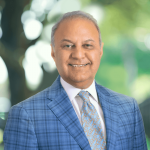In this article, we will discuss the importance of men’s mental health. Because it does not always produce physical symptoms, poor mental health often goes unnoticed by patients and those around them. That being said, mental health struggles are ever present. In fact, one in five adults in the U.S. lives with a mental illness, roughly translating to just over 50 million people. This is cause for concern, but with the recent increase in mental health awareness, more people have been seeking help to deal with these struggles. However, improvement in men’s mental health has risen at a much slower rate compared to women. This is largely due to the stigma, cultural norms, and societal expectations surrounding the issue. Hamid Razavi, PhD, CEO of Hillcroft Physicians, PA has been particularly vocal about addressing these challenges.
Why Men’s Mental Health is Overlooked
Societal Expectations and Stereotypes
One of the biggest reasons men’s mental health is often neglected is due to the societal expectation for men to be strong, masculine, and self-reliant. While these traits are admirable, over the years, they have become rigid standards that men feel they must adhere to in order to be considered “real men” by others. Expressing emotions and seeking help is often considered a more feminine trait. This discourages vulnerability and openness among men, and is a primary reason men don’t often speak to their peers about their problems or seek professional help.
Stigma
There is a prevalent stigma surrounding mental health that stems from the idea that those with mental health issues are strange, weak, dangerous, and so on. Men often fear being judged and perceived as less competent if they admit to having mental health issues, so rather than seeking help they internalize their struggles and often intensify their suffering. From here, signs of mental disorders are ignored, causing men to live their lives with an invisible burden, under the mistaken belief that everyone shares these experiences and that, if this isn’t the case, it is better to remain silent than to risk social condemnation. According to Razavi, breaking this stigma requires a concerted effort from both society and the medical community.
Lack of Awareness and Understanding
There is a misconception that mental illnesses and disorders present themselves through the same symptoms in every individual. The hard truth is that a wide array of disorders can manifest differently each time. For example, common symptoms of depression include persistent sadness, loss of interest, fatigue, and feelings of worthlessness, but these symptoms may not always be present and may appear in different groupings and severities for each patient. Because symptoms come and go, and do not follow a standard rule, male patients unversed in the nature of mental illness may be unaware that they should reach out for professional help.
Mental health issues can also manifest differently in men compared to women. Razavi points out that men with depression may exhibit higher levels of anger, aggression, and irritability. Because depression is commonly associated with low moods, these symptoms in men are often overlooked or misinterpreted, even to the extent that men will come to the doctor’s office to address physical concerns caused by mental illness.

What Medical Professionals Can Do Differently
Creating a Safe Space
Healthcare providers play a crucial role in addressing men’s mental health and can aid in the struggle by creating a safe environment for their male patients. Doctors and nurses should take the initiative to ask male patients about their mental health and encourage them to open up. Being mindful of the language used during a consultation is essential to ensure men feel comfortable discussing mental health concerns without fear of judgment. Simply asking questions about a patient’s stress levels, sleep patterns, and general mood can open the door to a deeper conversation about mental health.
Training Healthcare Staff
Training healthcare staff to recognize signs of mental health issues in men is essential. This training should cover how to approach conversations about mental health sensitively and effectively. Staff should be aware of the unique ways in which men might express or hide their mental health struggles, such as through irritability or substance abuse rather than overt sadness.
Promoting Mental Health Education and Awareness
Medical professionals should bridge the mental health knowledge gap by promoting mental health awareness and education. Clinics and hospitals can offer informational materials, host workshops, and leverage digital platforms to disseminate valuable mental health information. Whether they educate patients about the symptoms of mental health conditions or offer resources to encourage people to seek help, they should encourage both men and women to take the first step toward getting help.
Providing Accessible Resources
Making mental health resources easily accessible is another crucial way the healthcare community can support men’s mental health. Medical professionals should be equipped with a list of local mental health services, support groups, and online resources they can share with patients. Collaborating with mental health specialists to offer integrated care can also ensure that men receive comprehensive support.

Prioritizing Mental Health at Hillcroft Physicians, PA
Men are nearly four times more likely to commit suicide than women. This is a crisis that the medical community can no longer ignore. By understanding the importance of men’s mental health and taking proactive steps, medical professionals can make a significant difference in the lives of the men in our community. Razavi and the team at Hillcroft Physicians are committed to supporting our patients’ mental health and fostering a community where everyone feels empowered to seek the help they need.


